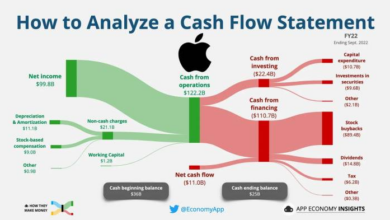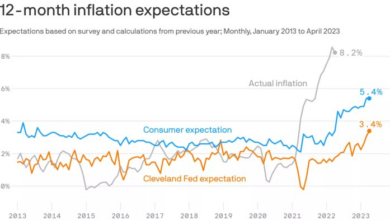
Indian Stock Market Updates: Navigating the Trends
Indian stock market updates are essential for anyone looking to invest in the dynamic and growing Indian economy. The Indian stock market, with its diverse range of companies and sectors, offers exciting opportunities for investors, but understanding the nuances of this market is crucial for making informed decisions.
From analyzing the performance of major indices like the Sensex and Nifty to understanding the impact of economic indicators and government policies, this blog delves into the intricacies of the Indian stock market, offering insights into current trends, potential investment opportunities, and the risks involved.
Overview of the Indian Stock Market

The Indian stock market, a vibrant and dynamic financial ecosystem, plays a crucial role in the nation’s economic growth. It serves as a platform for businesses to raise capital and for investors to participate in the growth story of India.
This overview delves into the key characteristics, regulatory framework, and historical milestones of this important market.
Size and Structure
The Indian stock market is one of the largest in the world, boasting a market capitalization exceeding $3 trillion. The market comprises two main segments: the Bombay Stock Exchange (BSE) and the National Stock Exchange of India (NSE). Both exchanges offer a wide range of trading platforms, including equity, derivatives, and commodities.
Major Indices, Indian stock market updates
The Indian stock market is represented by several key indices that track the performance of different sectors and segments. The most prominent indices include:
- Sensex:The benchmark index of the BSE, representing 30 of the largest and most liquid companies listed on the exchange.
- Nifty 50:The benchmark index of the NSE, representing 50 of the largest and most liquid companies listed on the exchange.
- Nifty Bank:Tracks the performance of 12 of the largest public and private sector banks listed on the NSE.
- Nifty IT:Tracks the performance of 10 of the largest information technology companies listed on the NSE.
Role of SEBI
The Securities and Exchange Board of India (SEBI) plays a vital role in regulating the Indian stock market. SEBI’s primary objective is to protect the interests of investors and ensure the smooth functioning of the market. Its key responsibilities include:
- Setting rules and regulations:SEBI establishes rules and regulations governing the issuance, trading, and listing of securities.
- Monitoring market activities:SEBI monitors market activities to identify and prevent fraudulent practices.
- Protecting investor interests:SEBI promotes investor education and awareness to protect investors from scams and unfair practices.
Historical Milestones
The Indian stock market has witnessed significant milestones and trends over the years:
- 1875:The first stock exchange in India, the Bombay Stock Exchange (BSE), was established.
- 1992:The introduction of the National Stock Exchange of India (NSE) marked a significant shift towards a dematerialized and computerized trading system.
- 1995:SEBI was established as the regulatory body for the Indian securities market.
- 2000s:The Indian stock market experienced rapid growth driven by economic reforms and globalization.
- 2010s:The market witnessed a surge in foreign institutional investor (FII) participation and the emergence of new sectors, such as technology and e-commerce.
Recent Market Performance and Trends: Indian Stock Market Updates
The Indian stock market has witnessed a mixed performance in recent times, influenced by a confluence of global and domestic factors. The benchmark indices, Sensex and Nifty, have shown resilience in the face of volatility, but certain sectors have outperformed others, reflecting the dynamic nature of the market.
Performance of Major Indices
The Sensex and Nifty have exhibited a mixed performance over the past quarter and year. The Sensex gained approximately 5% in the last quarter, while the Nifty registered a growth of around 4%. However, over the past year, the Sensex has witnessed a decline of about 2%, while the Nifty has shown a marginal gain of less than 1%.
This disparity in performance reflects the impact of various economic and geopolitical factors on different sectors and companies.
Factors Driving Market Trends
Several factors have contributed to the recent market trends, including:
- Economic Growth:India’s robust economic growth, driven by strong domestic demand and government initiatives, has provided a positive backdrop for the stock market. The country’s GDP growth is expected to remain healthy in the coming years, supporting corporate earnings and investor sentiment.
- Inflation:Inflation has been a concern for investors, as rising prices can erode corporate profits and consumer spending. The Reserve Bank of India (RBI) has been taking measures to control inflation, but its impact on the market remains a key factor to watch.
- Global Events:Geopolitical events, such as the Russia-Ukraine war and the global economic slowdown, have created volatility in the Indian stock market. These events have impacted commodity prices, supply chains, and investor confidence, influencing market sentiment.
- Sectoral Performance:Different sectors within the Indian stock market have performed differently. The IT sector has been under pressure due to global economic headwinds, while the banking and financial services sector has shown resilience. The energy sector has benefited from rising oil prices, while the consumer discretionary sector has been impacted by inflation.
Comparison of Sectoral Performance
The performance of different sectors within the Indian stock market has varied significantly, reflecting the impact of various factors on different industries.
- IT Sector:The IT sector has faced challenges due to global economic slowdown and concerns about slowing tech spending. The sector has witnessed a decline in earnings and valuations, leading to underperformance in the stock market.
- Banking and Financial Services:The banking and financial services sector has shown resilience, benefiting from strong credit growth and improved asset quality. The sector has also benefited from rising interest rates, which have boosted profitability.
- Energy Sector:The energy sector has been a top performer, driven by rising oil and gas prices. The sector has benefited from increased demand and supply constraints, leading to higher earnings and valuations.
- Consumer Discretionary Sector:The consumer discretionary sector has been impacted by inflation, as rising prices have eroded consumer spending. The sector has witnessed a slowdown in growth and earnings, leading to underperformance in the stock market.
Key Economic Indicators and Their Impact
The Indian stock market, like any other financial market, is closely tied to the health of the country’s economy. Key economic indicators provide valuable insights into the overall economic performance, which, in turn, influences investor sentiment and market trends. Understanding the relationship between these indicators and stock market performance is crucial for investors seeking to make informed decisions.
Relationship Between Economic Indicators and Stock Market Performance
Economic indicators, such as GDP growth, inflation, and interest rates, serve as barometers of the economy’s health. They provide insights into the growth potential, price stability, and borrowing costs within the country. A strong and consistent economic performance, reflected in robust GDP growth, stable inflation, and reasonable interest rates, tends to create a positive environment for stock market growth.
- GDP Growth:A healthy GDP growth rate indicates a thriving economy, suggesting increased corporate earnings and investment opportunities. This, in turn, fuels investor confidence and drives stock prices upwards. Conversely, a slowdown in GDP growth can lead to decreased earnings and a pessimistic outlook, potentially causing stock prices to decline.
- Inflation:Inflation, the rate at which prices rise, can have a mixed impact on the stock market. Moderate inflation is generally considered healthy for the economy, as it stimulates spending and investment. However, high inflation erodes purchasing power and can lead to uncertainty, making investors cautious and potentially impacting stock market performance negatively.
- Interest Rates:Interest rates influence borrowing costs for businesses and individuals. Lower interest rates encourage investment and economic growth, creating a favorable environment for the stock market. Conversely, higher interest rates increase borrowing costs, potentially slowing economic activity and impacting stock market performance.
Impact of Government Policies and Regulatory Changes
Government policies and regulatory changes can significantly impact the stock market. These changes can affect investor sentiment, business confidence, and overall economic activity.
- Fiscal Policy:Government spending and taxation policies, collectively known as fiscal policy, can influence economic growth and investor sentiment. Expansionary fiscal policies, such as tax cuts or increased government spending, can stimulate economic activity and potentially boost the stock market.
Conversely, contractionary policies, such as tax increases or spending cuts, can dampen economic growth and lead to a decline in stock prices.
- Monetary Policy:The central bank’s policies on interest rates and money supply, known as monetary policy, play a crucial role in managing inflation and economic growth. Lower interest rates and increased money supply can stimulate economic activity and potentially lead to a rise in stock prices.
Conversely, higher interest rates and a reduction in money supply can curb inflation but may also slow economic growth and impact stock market performance.
- Regulatory Changes:Changes in regulations, such as those related to corporate governance, environmental protection, or financial reporting, can impact business operations and investor confidence. Positive regulatory changes that promote transparency, accountability, and sustainable practices can create a favorable environment for the stock market.
Conversely, stringent or unpredictable regulations can create uncertainty and negatively impact investor sentiment.
Potential Impact of Upcoming Economic Events
Upcoming economic events, such as elections, global trade agreements, or major economic announcements, can significantly influence investor expectations and stock market performance.
- Elections:Political uncertainty surrounding elections can impact investor confidence and market volatility. Policy changes or shifts in economic priorities proposed by different political parties can create uncertainty and influence stock market movements.
- Global Trade Agreements:Trade agreements, particularly those involving major economies, can have a significant impact on businesses and the stock market. New trade agreements can create opportunities for businesses and boost investor confidence, while trade disputes or protectionist measures can lead to uncertainty and market volatility.
- Economic Announcements:Key economic announcements, such as inflation data, employment reports, or interest rate decisions, can provide valuable insights into the economy’s health and influence investor sentiment. Positive economic data can boost investor confidence and drive stock prices upwards, while negative data can lead to a decline in market performance.
Major Market Participants and Their Strategies
The Indian stock market is a vibrant ecosystem with a diverse range of participants, each with their own unique strategies and objectives. Understanding these participants and their approaches is crucial for gaining a comprehensive understanding of the market dynamics.
Institutional Investors
Institutional investors play a significant role in the Indian stock market, contributing substantial capital and influencing market trends. They include:
- Mutual Funds:Mutual funds pool money from multiple investors and invest in a diversified portfolio of stocks. They offer various schemes catering to different risk appetites and investment goals.
- Insurance Companies:Life insurance companies invest a portion of their premium income in the stock market, seeking long-term growth and stability.
- Pension Funds:Pension funds manage retirement savings and invest in stocks to generate returns for future payouts.
- Banks:Banks, particularly public sector banks, invest in stocks as part of their asset allocation strategy.
Institutional investors typically adopt a long-term investment approach, focusing on fundamental analysis and value investing. They analyze companies’ financial performance, growth prospects, and industry trends before making investment decisions.
Retail Investors
Retail investors, comprising individual investors, contribute to the market liquidity and provide a broad base of participation. Their investment strategies vary significantly, ranging from:
- Short-term trading:Some retail investors engage in frequent buying and selling of stocks, aiming to capitalize on short-term price fluctuations.
- Long-term investing:Others adopt a buy-and-hold strategy, investing in companies they believe will grow over the long term.
- Value investing:Some retail investors focus on undervalued companies with strong fundamentals, aiming to buy low and sell high.
- Growth investing:Others seek out companies with high growth potential, even if they are currently priced at a premium.
Retail investors often rely on a combination of technical analysis, fundamental analysis, and market sentiment to make investment decisions.
Market Makers
Market makers are financial institutions that provide liquidity to the market by continuously quoting bid and offer prices for stocks. They ensure smooth trading by facilitating transactions between buyers and sellers.
- Brokerage firms:Brokerage firms act as market makers, providing quotes and executing trades for their clients.
- Proprietary trading desks:Some financial institutions operate proprietary trading desks, making market-making activities a core part of their business.
Market makers play a crucial role in maintaining market stability and ensuring fair prices for all participants. They are incentivized to provide liquidity by profiting from the bid-ask spread, the difference between the buying and selling prices.
Foreign Institutional Investors (FIIs)
Foreign institutional investors (FIIs) are non-resident investors who invest in Indian securities. They play a significant role in the Indian stock market, bringing in foreign capital and influencing market sentiment.
- Mutual Funds:Foreign mutual funds invest in Indian stocks, seeking exposure to the emerging market.
- Hedge Funds:Hedge funds, known for their aggressive investment strategies, may invest in Indian stocks to capitalize on market opportunities.
- Pension Funds:Foreign pension funds diversify their portfolios by investing in Indian stocks.
FIIs typically adopt a long-term investment approach, focusing on companies with strong growth potential and a favorable economic outlook. Their investment decisions are influenced by factors such as India’s economic growth, regulatory environment, and political stability.
Emerging Trends and Opportunities

The Indian stock market is witnessing a dynamic evolution, driven by emerging trends that are shaping investment strategies and presenting exciting opportunities for growth. From the rise of technology stocks to the increasing prominence of ESG investing, these trends are reshaping the landscape of the Indian market.
Growth of Technology Stocks
The Indian technology sector is experiencing phenomenal growth, fueled by rapid digitalization, increasing internet penetration, and a burgeoning startup ecosystem. This growth is reflected in the performance of technology stocks on the Indian stock exchanges.
- Increased Demand for Digital Services:The pandemic accelerated the adoption of digital services across various sectors, driving demand for technology companies offering solutions in e-commerce, fintech, online education, and healthcare.
- Government Initiatives:The Indian government’s initiatives to promote digitalization, such as the Digital India program, are creating a favorable environment for technology companies to thrive.
- Strong Investor Interest:Technology stocks are attracting significant investor interest due to their growth potential and the belief that they will continue to be major drivers of the Indian economy.
Rise of ESG Investing
Environmental, social, and governance (ESG) considerations are gaining traction among investors, who are increasingly seeking companies that align with their values and contribute to a sustainable future.
- Growing Awareness:Rising awareness about climate change, social inequality, and corporate governance issues is driving investors towards ESG-compliant companies.
- Regulatory Push:The Indian government is introducing regulations and policies to promote ESG principles in corporate governance, further encouraging ESG investing.
- Investment Opportunities:ESG investing presents opportunities in sectors such as renewable energy, sustainable agriculture, and responsible manufacturing, offering both financial returns and positive societal impact.
Increasing Popularity of Mutual Funds
Mutual funds have become increasingly popular among Indian investors, offering a convenient and diversified way to participate in the stock market.
- Accessibility and Convenience:Mutual funds provide access to a wide range of investment options, including stocks, bonds, and real estate, with relatively low investment thresholds.
- Professional Management:Mutual funds are managed by experienced fund managers who use their expertise to select and manage investments, reducing the need for individual investors to have extensive market knowledge.
- Diversification:Investing in mutual funds provides diversification, reducing portfolio risk by spreading investments across multiple assets.
Impact of Digitalization and Technological Advancements
Digitalization and technological advancements are profoundly impacting the Indian stock market, leading to increased efficiency, transparency, and accessibility.
- Online Trading Platforms:The proliferation of online trading platforms has made stock market participation more accessible to a wider range of investors.
- Real-time Data and Analytics:Advanced data analytics and real-time information access empower investors with better insights and decision-making capabilities.
- Automated Trading:Algorithmic trading and automated trading systems are increasing efficiency and reducing human error in the market.
Risks and Challenges
The Indian stock market, like any other financial market, is not immune to risks and challenges. While the market has shown resilience and growth in recent years, it’s crucial to acknowledge the potential hurdles that could impact investor returns and overall market performance.
Market Volatility
Volatility is an inherent characteristic of the stock market, and the Indian market is no exception. This volatility can be driven by various factors, including:
- Economic News:Positive or negative economic data releases, such as GDP growth, inflation figures, and unemployment rates, can trigger market swings.
- Political Events:Political instability, changes in government policies, and geopolitical tensions can create uncertainty and impact investor sentiment.
- Global Events:Global economic downturns, financial crises, and international trade disputes can ripple through the Indian market, affecting investor confidence and investment decisions.
- Company-Specific Factors:Corporate earnings announcements, mergers and acquisitions, and changes in company management can lead to price fluctuations in individual stocks.
The impact of volatility can be particularly pronounced during periods of market uncertainty, such as during economic slowdowns or geopolitical crises. Investors need to be prepared for market fluctuations and have a well-defined risk tolerance.
Economic Uncertainty
Economic uncertainty is a significant challenge for the Indian stock market. Factors such as:
- Inflation:High inflation erodes purchasing power and can lead to higher interest rates, making it more expensive for businesses to borrow money and potentially impacting corporate earnings.
- Interest Rate Changes:Changes in interest rates by the Reserve Bank of India (RBI) can influence borrowing costs for businesses and impact overall economic growth.
- Currency Fluctuations:The Indian rupee’s exchange rate against major currencies can affect the profitability of Indian companies with significant foreign operations.
- Government Policies:Changes in government policies, such as tax regulations, infrastructure spending, and trade agreements, can create uncertainty for businesses and investors.
Navigating economic uncertainty requires careful analysis and a long-term perspective. Investors need to consider the potential impact of economic factors on their investments and adjust their portfolios accordingly.
Regulatory Changes
The Indian stock market is subject to regulations by the Securities and Exchange Board of India (SEBI), which aims to protect investors and ensure fair and transparent market practices. However, changes in regulations can create uncertainty for investors and impact market sentiment.
- New Regulations:SEBI’s introduction of new regulations, such as stricter disclosure requirements or changes in trading rules, can create uncertainty and lead to market adjustments.
- Enforcement of Existing Regulations:Increased enforcement of existing regulations can lead to greater compliance costs for companies and potentially impact their financial performance.
- Changes in Tax Laws:Changes in tax laws can impact corporate earnings and investor returns, leading to market fluctuations.
Staying informed about regulatory changes and their potential impact is crucial for investors. It’s essential to understand how these changes might affect specific companies and sectors.
Impact of Global Events and Geopolitical Tensions
The Indian stock market is increasingly integrated into the global economy, making it susceptible to the impact of global events and geopolitical tensions.
- Global Economic Slowdowns:Recessions or economic slowdowns in major economies can have a spillover effect on the Indian market, impacting investor confidence and reducing demand for Indian goods and services.
- Geopolitical Conflicts:Wars, political instability, and trade disputes can disrupt global supply chains, increase commodity prices, and create uncertainty in financial markets.
- International Trade Policies:Changes in international trade policies, such as tariffs or trade agreements, can impact the competitiveness of Indian businesses and influence market sentiment.
Investors need to monitor global events and geopolitical tensions closely, as they can have a significant impact on the Indian stock market. Understanding the potential implications of these events on specific sectors and companies can help investors make informed decisions.
Strategies for Mitigating Risk
While the Indian stock market presents opportunities for growth, it’s essential to acknowledge the inherent risks and develop strategies for mitigating them.
- Diversification:Diversifying investments across different asset classes, sectors, and geographies can help reduce overall portfolio risk.
- Long-Term Perspective:Maintaining a long-term investment horizon can help weather short-term market fluctuations and focus on the underlying fundamentals of the companies and sectors in which you invest.
- Thorough Research:Conducting thorough research on companies and sectors before investing can help identify companies with strong fundamentals, sustainable growth potential, and a track record of profitability.
- Risk Management:Setting clear investment goals, understanding your risk tolerance, and using stop-loss orders to limit potential losses are essential risk management strategies.
- Professional Advice:Seeking advice from qualified financial advisors can provide valuable insights and help you develop a customized investment strategy tailored to your individual needs and goals.
Risk management is an ongoing process that requires constant monitoring and adjustments based on market conditions and your investment goals. It’s crucial to stay informed, adapt your strategies as needed, and seek professional guidance when necessary.
Investment Strategies and Advice
Navigating the Indian stock market requires a well-defined investment strategy. Understanding different approaches and their nuances is crucial for maximizing returns and managing risk effectively. This section delves into popular investment strategies, portfolio diversification, risk management, and selecting suitable investment products for various investor profiles.
Value Investing
Value investing emphasizes identifying undervalued stocks with strong fundamentals. Value investors seek companies with a solid track record, a robust financial position, and a market price that is below their intrinsic value. They believe that the market undervalues these companies and will eventually recognize their true worth, leading to price appreciation.
Value investors often use metrics like price-to-earnings ratio (P/E), price-to-book ratio (P/B), and dividend yield to identify undervalued stocks.
Growth Investing
Growth investing focuses on companies with rapid earnings growth and the potential for future expansion. Growth investors seek companies with innovative products or services, strong market share, and a competitive advantage. They believe that these companies will continue to outperform the market in the long run, driving significant capital appreciation.
Growth investors often look for companies with high revenue growth, strong profit margins, and a history of successful product launches.
Momentum Investing
Momentum investing seeks to capitalize on the trend of rising stock prices. Momentum investors identify stocks that have recently performed well and are expected to continue their upward trajectory. They believe that market trends can persist for a while, and by riding the wave of momentum, they can achieve substantial returns.
Momentum investors use technical indicators such as moving averages and relative strength index (RSI) to identify stocks with strong upward momentum.
Portfolio Diversification
Portfolio diversification is essential for managing risk in the Indian stock market. It involves spreading investments across different asset classes, sectors, and market capitalizations. By diversifying, investors can reduce the impact of any single investment performing poorly on their overall portfolio.
A diversified portfolio can include stocks, bonds, real estate, gold, and other assets.
Risk Management
Risk management is crucial for all investors, regardless of their investment style. It involves identifying and mitigating potential risks that could negatively impact portfolio performance. This includes understanding the level of risk associated with different investments, setting realistic return expectations, and having a clear exit strategy.
Risk management strategies include setting stop-loss orders, diversifying investments, and using leverage prudently.
Choosing the Right Investment Products and Services
Selecting the right investment products and services depends on an investor’s individual needs, goals, and risk tolerance. Some common investment products available in the Indian stock market include:
- Equity Shares:Direct ownership in a company, offering potential for capital appreciation and dividends.
- Mutual Funds:Professionally managed portfolios of stocks, bonds, or other assets, providing diversification and access to expertise.
- Exchange-Traded Funds (ETFs):Funds traded on stock exchanges, offering diversification and lower costs than traditional mutual funds.
- Derivatives:Contracts that derive their value from underlying assets, offering leverage and hedging opportunities.
Investment Advice for Different Investor Profiles
- Beginner Investors:Focus on index funds or diversified mutual funds to gain exposure to the market and learn about investing.
- Intermediate Investors:Explore sector-specific mutual funds or ETFs to invest in specific areas of interest, such as technology or healthcare.
- Experienced Investors:Consider direct stock investments, derivatives, or alternative investments to enhance portfolio returns and manage risk.
Data and Resources
Navigating the Indian stock market effectively requires access to reliable and comprehensive data. This section will provide a curated list of valuable resources that can empower your investment decisions.
Stock Exchanges
Stock exchanges are the central hubs for trading securities. They provide real-time data, historical records, and market information. Here are the primary stock exchanges in India:
- National Stock Exchange of India (NSE): https://www.nseindia.com/
- Bombay Stock Exchange (BSE): https://www.bseindia.com/
Financial News Providers
Financial news providers offer real-time market updates, analysis, and expert opinions. They are crucial for staying informed about market trends and making informed investment decisions.
- Bloomberg: https://www.bloomberg.com/
- Reuters: https://www.reuters.com/
- Economic Times: https://economictimes.indiatimes.com/
- Livemint: https://www.livemint.com/
Government Agencies
Government agencies provide essential economic data and regulatory information that influence market movements.
- Reserve Bank of India (RBI): https://www.rbi.org.in/
- Ministry of Finance, Government of India: https://www.finmin.gov.in/
- National Statistical Office (NSO): https://www.mospi.gov.in/
Real-time Stock Quotes and Historical Data
Several platforms offer real-time stock quotes and historical data, enabling you to track price movements and analyze trends.
- NSE Website:The NSE website provides real-time stock quotes, charts, and historical data for listed companies.
- BSE Website:Similar to the NSE, the BSE website offers real-time stock quotes and historical data.
- Financial Data Providers:Platforms like Bloomberg Terminal, Refinitiv Eikon, and FactSet offer comprehensive financial data, including real-time quotes, historical data, and analytics.
- Brokerage Platforms:Many online brokerage platforms provide real-time stock quotes, charting tools, and historical data for their clients.






